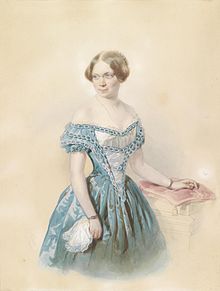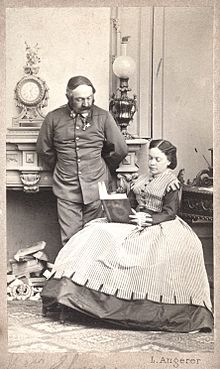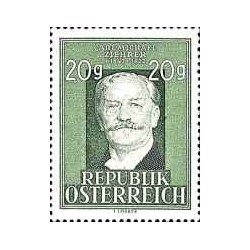- جدید
- ناموجود



توجه : درج کد پستی و شماره تلفن همراه و ثابت جهت ارسال مرسوله الزامیست .
توجه:حداقل ارزش بسته سفارش شده بدون هزینه پستی می بایست 100000 ریال باشد .
Baroness Marie von Ebner-Eschenbach (Czech: Marie von Ebner-Eschenbachová, German: Marie Freifrau von Ebner-Eschenbach; September 13, 1830 – March 12, 1916) was an Austrian writer.[1] Noted for her excellent psychological novels, she is regarded—together with Ferdinand von Saar—as one of the most important German-language writers of the latter portion of the 19th century.
She was born at the castle of the Catholic Dubský (Dubský von Třebomyslice) noble family in Zdislavice (present Czech Republic) near Kroměříž in Moravia , the daughter of Baron (from 1843: Count) Dubsky and his wife Maria, née Baroness Vockel, who came from a Protestant-Saxon background. Marie lost her mother in early infancy, but received a careful intellectual training from two stepmothers. In 1848 she married her cousin, the Austrian captain, and subsequent field-marshal, Moritz von Ebner-Eschenbach. The couple resided first in Vienna, then at Louka (Klosterbruck) near Znojmo, where her husband had a military charge, and after 1860 again in Vienna. The marriage was childless.
Marie began devoting herself to literary work. In her endeavours she received assistance and encouragement from Franz Grillparzer and Freiherr von Münch-Bellinghausen. Her first publicized work was the drama Maria Stuart in Scotland (German: Maria Stuart in Schottland), which Philipp Eduard Devrient produced at the Karlsruhe theatre in 1860. Then came a tragedy in five acts, Marie Roland, with several one-act dramas: Doktor Ritter, Violets (German: Das Veilchen), and The Disconsolate One.
After these limited successes in the field of drama, she turned to narrative. Commencing with Die Prinzessin von Banalien (1872), she graphically depicts in Božena (Stuttgart, 1876, 4th ed. 1899) and Das Gemeindekind (Berlin, 1887, 4th ed. 1900) the surroundings of her Moravian home, and in Lotti, die Uhrmacherin (Berlin, 1883, 4th ed. 1900), Zwei Comtessen (Berlin, 1885, 5th ed. 1898), Unsühnbar (1890, 5th ed. 1900) and Glaubenslos? (1893) the life of the Austrian aristocracy in town and country.
She also published Neue Erzählungen (Berlin, 1881, 3rd ed. 1894), Aphorismen (Berlin, 1880, 4th ed. 1895) and Parabeln, Märchen und Gedichte (2nd ed., Berlin, 1892). Von Ebner-Eschenbach's elegance of style, her incisive wit and masterly depiction of character give her a foremost place among the German women writers of her time. On the occasion of her 70th birthday the university of Vienna conferred upon her the degree of doctor of philosophy, honoris causa. An edition of Marie von Ebner-Eschenbach's Gesammelte Schriften (Collected Works) began to appear in 1893 (Berlin).
She died in Vienna, Austria-Hungary.
تشکر نظر شما نمی تواند ارسال شود
گزارش کردن نظر
گزارش ارسال شد
گزارش شما نمی تواند ارسال شود
بررسی خود را بنویسید
نظر ارسال شد
نظر شما نمی تواند ارسال شود

check_circle
check_circle


















